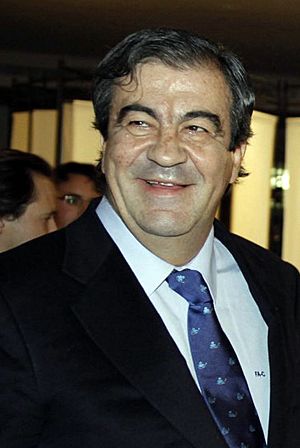Francisco Álvarez-Cascos facts for kids
Quick facts for kids
The Most Excellent
Francisco Álvarez-Cascos
|
|
|---|---|
 |
|
| Deputy Prime Minister of Spain | |
| In office 6 May 1996 – 27 April 2000 |
|
| Prime Minister | José María Aznar |
| Preceded by | Narcís Serra |
| Succeeded by | Mariano Rajoy |
| 7th President of the Principality of Asturias | |
| In office 15 July 2011 – 26 May 2012 |
|
| Monarch | Juan Carlos I |
| Preceded by | Vicente Álvarez Areces |
| Succeeded by | Javier Fernández Fernández |
| Personal details | |
| Born | 1 October 1947 Madrid, Spain |
| Political party | Foro Asturias (FAC) (2011–present) |
| Other political affiliations |
PP (1976–2009) |
Francisco Álvarez-Cascos Fernández was born on October 1, 1947. He is a Spanish politician who has held important roles in the government. He was the Secretary-General of the People's Party from 1989 to 1999. Later, he served as the President of the Principality of Asturias from 2011 to 2012.
Contents
Early Life and Political Start
Francisco Álvarez-Cascos first studied to become a civil engineer. After his studies, he worked in architecture for a few years. Soon, he decided to focus on a career in politics.
Joining Political Parties
In 1976, he joined a political group called Reforma Democrática. This group later joined with another party, Alianza Popular. Both of these were right-leaning political parties. This means they generally supported traditional values and less government involvement in the economy.
Roles in Local Government
From 1979 to 1986, Álvarez-Cascos was a spokesman for the Gijón Council. He also served as a county councilor. He was part of the regional Pre-Autonomous Body, which helped prepare Asturias for more self-governance.
National Political Career
In 1982, Alianza Popular joined with other groups to form the People's Party. This new party was considered center-right. Álvarez-Cascos was elected as a senator for Asturias.
Serving in Parliament
While a senator, he also spoke for the People's Party in the regional parliament of Asturias. This parliament is called the General Junta of the Principate of Asturias. In 1986, he was elected as a deputy for Asturias. He was re-elected to this position several times, serving until 2000.
Secretary-General of the People's Party
At a big meeting of the People's Party in 1989, Álvarez-Cascos was chosen as the Secretary-General. This is a very important leadership role within the party. He was re-elected to this position three more times.
Government Minister Roles
From 1996 to 2000, he served as the First Vice President of the Government. He was also the Minister of the Presidency during this time. From 2000 to 2004, he became the Minister for Development. In 2004, he left Congress and took a break from politics.
President of Asturias
In 2009, some members of the People's Party wanted Álvarez-Cascos to run for President of Asturias. They held meetings and campaigned for him to be the party's candidate. However, the regional leaders of the party did not support him.
Forming a New Party
Because he was not supported by his party's national leader, Mariano Rajoy, he left the People's Party. In just five months, he created a new political party called Asturian Forum. In May 2011, his new party won 16 out of 45 seats in the Asturian parliament. This was the most seats for any single party.
Leading the Government
With the most seats, Francisco Álvarez-Cascos became the President of Asturias. He led a minority government, meaning his party did not have enough seats to pass laws easily. Other parties, like the People's Party and the Socialist Party, often voted against his proposals.
Resignation and New Elections
After six months, his budget for 2012 was rejected by the parliament. This made it very difficult to govern. Because of this blocked situation, he resigned on January 30, 2012. He then called for new elections to be held on March 25. In these new elections, his Asturian Forum party lost 4 seats and came in second place.
Images for kids
See also
 In Spanish: Francisco Álvarez-Cascos para niños
In Spanish: Francisco Álvarez-Cascos para niños


